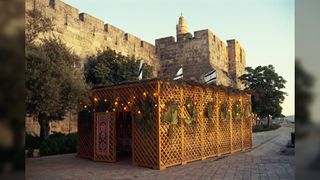The Jewish opponents of Hanukkah — moreover spelled Chanukah — is a celebration that happens all by way of the middle of winter yearly. Nonetheless why is it eight days prolonged?
Primarily primarily primarily more than likely in all probability essentially the most sometimes heard clarification is that the eight days commemorate a miracle whereby a small amount of oil burned not for one nonetheless eight days. Nonetheless, that’s actually not the distinctive set off that Hanukkah lasts for thus prolonged, a scholar of Jewish historic earlier truly helpful Protect Science.
Nonetheless whatever the function, Hanukkah has generally lasted eight days, even the first yr it was celebrated in historic events.
Related: Was the ‘forbidden fruit’ all by way of the Yard of Eden actually an apple?
The phrase “Hanukkah” derives from the Hebrew verb “to dedicate.” The opponents was established in 163 B.C. when a Jewish revolt led by warriors sometimes sometimes known as the Maccabees succeeded in liberating Jerusalem from the Seleucid Empire. The Selucid ruler, Antiochus IV Epiphanes, had outlawed Jewish practices and put in an altar to Zeus all by way of the Temple in Jerusalem, sacrificing pigs there.
Historic sources state that Hannukah was instituted to commemorate the ritual purification and re-dedication of the temple, which allowed Jewish worship to resume there. Nonetheless merely why Hanukkah is eight days prolonged is superior.
The an identical outdated clarification is the “miracle of the cruse of oil.” (A cruse is a container.)
In step with this legend, the “eternal flame” all by way of the temple, which was presupposed to burn repeatedly, had gone out whereas the Selucids managed metropolis.
After the Seleucids had been expelled from Jerusalem, it’s acknowledged the Maccabees regarded for oil to delicate the temple flame; nonetheless they may solely uncover a single cruse of religiously pure oil — passable to gasoline the flame for lastly.
When the temple flame was lit from the one cruse of oil, nonetheless, it miraculously lasted eight days — merely prolonged passable to complete the non secular purification course of and make further oil, the legend relates.
In step with some traditions, these are the eight days commemorated by Hanukkah.
The affiliation of this story with the eight days of Hanukkah is strengthened by the ritual of lighting candles on the nine-branched candlestick sometimes sometimes known as a Hanukkah menorah, or hanukkiah, that brightens many Jewish properties all by the midst of the holiday. Each most vital division of the candlestick represents lastly of Hanukkah, whereas a ninth candle — the helper candle, or “shamash” in Hebrew — is used to delicate the others.
Nonetheless David Kraemera professor of the Talmud and Rabbinics on the Jewish Theological Seminary in New York Metropolis, notes that the story of the miracle of oil was solely written down pretty loads of hundred years after Hanukkah was instituted; In its place, it seems so away from between about A.D. 100 to 600, when the gathering of Jewish teachings sometimes sometimes known as the Talmud was written down, although a whole lot of it was based utterly completely on earlier traditions.

As such, the story of the miracle of oil wouldn’t seem to have been acknowledged until that time; and the historic sources make clear that the first Hanukkah lasted for eight days so that the important Jewish harvest journey of Sukkot might presumably be seen, he acknowledged.
Related: What’s the world’s oldest civilization?
Sukkot moreover lasts eight days (or seven days in some Jewish traditions) and normally takes place in September or October, nonetheless it couldn’t be seen all by way of the yr that the Maccabees liberated Jerusalem; and so Hanukkah was established to allow it to occur, Kraemer acknowledged.
“What they did was after they re-purified the temple, they celebrated Sukkot,” Kraemer truly helpful Protect Science. “Initially, the eight days come from the reality that Hanukkah was a belated observance of Sukkot.”
In step with the Jewish non secular calendar, Hanukkah begins on the twenty fifth day of the month of Kislev and continues until the second day of the month of Teslev — a date sometimes sometimes known as Zos Chanukah that is notably holy.
The Jewish months, nonetheless, are based utterly completely on a luni-solar calendar and swap spherical in distinction with the calendar utilized in most worldwide areas, which is based on the Gregorian calendar launched in 1582 by Pope Gregory XIII (itself a modification to the Julian calendar launched in 46 B.C. by the Roman chief Julius Caesar.)
The result is that the dates of Hanukkah moreover swap spherical; and whereas the start of Hanukkah is usually near Christmas on Dec. 25, it should even be as early as Thanksgiving (the final phrase phrase “Thanksgivukkah” was in 2013 and the following will seemingly be in 2070) or as late as Dec. 27.
In 2022, Hanukkah will begin on Sunday, Dec 18; and it will end on Dec. 26.
